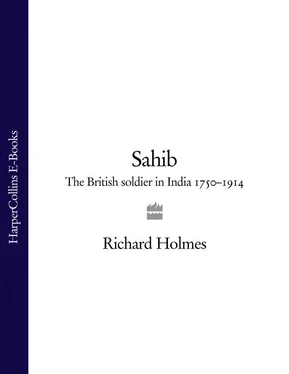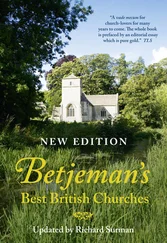1 ...6 7 8 10 11 12 ...15 It was given: ‘Forward, 3rd King’s Own Light Dragoons,’ an order the colonel used when he was in a good temper. On we went by the dead and dying, and partly over the poor fellows, and up the parapet our horses scrambled. One of the Sikh artillery men struck at me with his sponge staff but missed me, hitting my horse on the hindquarters which made the horse bend down. I cut round at him but cannot say where, as there was such a smoke on. I went with the rest through the Camp at their battalions which we broke up. 26
There would later follow an unedifying squabble as to whose attack was actually decisive, with Thackwell complaining that Gough’s dispatch did not do sufficient justice to his charge. But it seems true to say that it was the simultaneous concentric attack that was the Sikhs’ undoing. Nor were they helped by the fact that Tej Singh, their commander in chief, who had been in treasonable dealings with the British, had fled during the night. Yet even now this, the most formidable army ever encountered by the British in India, fought it out resolutely. Old Sham Singh, comrade-in-arms of Ranjit Singh, founder of the Sikh State, had sworn to conquer or die, and Captain J. D. Cunningham saw that he was as good as his word.
Calling on all around to fight for the Guru, who had promised everlasting bliss to the brave, he repeatedly rallied his shattered ranks, and at last fell a martyr on a heap of his slain countrymen. Others might be seen standing on the ramparts amongst a shower of balls, waving defiance with their swords, or telling the gunners where the fair-headed English pressed closest together … The parapets were sprinkled with blood from end to end; the trenches were filled with the dead and the dying. Amid the deafening roar of cannon, and the multitudinous fire of musketry, shouts of triumph or scorn were yet heard, and the flashing of innumerable swords was yet visible; from time to time exploding magazines of powder threw bursting shells and beams of wood and banks of earth high above the agitated sea of smoke and flame which enveloped the hosts of combatants … 27
As the Sikhs began to give way, slowly and stubbornly, they found that ‘by a strange fatality’ the Sutlej had risen seven feet during the night because of rain upstream, and was now unfordable. The single bridge was their only means of escape, and Captain Arthur Hardinge, serving on his father’s staff, watched what happened:
I saw the bridge at that moment overcrowded with guns, horses, and soldiers of all arms, swaying to and fro, till at last with a crash it disappeared into the running waters, carrying with it all those who had vainly hoped to reach the opposite shore. The artillery, now brought down to the water’s edge, completed the slaughter. Few escaped; none, it may be said, surrendered. 28
Robert Cust, also on Hardinge’s staff, wrote that:
The stream was choked with the dead and dying – the sandbags were covered with bodies floating leisurely down. It was an awful scene, fearful carnage. The dead Sikh lay inside his trenches – the dead European marked too distinctively the line each regiment had taken, the advance. The living Europeans remarked that nought could resist the bayonet … Our loss was heavy and the ground was here and there strewn with the slain, among whom I recognised a fine and handsome lad whom I had well known, young Hamilton, brother of Alistair Stewart. There he lay, his auburn hair weltering in his blood, his forehead fearfully gashed, fingers cut off. Still warm, but quite dead. 29
Subadar Sita Ram, attacking with his regiment of Bengal Native Infantry, recalled that ‘not one’ of the Sikhs asked for quarter. But as he approached the bridge he saw:
an English soldier about to bayonet a wounded Sikh. To my surprise, the man begged for mercy, a thing no Sikh had ever been known to do during the war. The soldier then pulled off the man’s turban and jacket, and after this I saw him kick the prostrate man and then run him through several times with his bayonet. Several other soldiers kicked the body with great contempt and ran their bayonets through it. I was told later that this was a deserter from some European regiment who had been fighting with the Sikhs against his comrades. 30
The fighting was over by midday. The Sikhs had lost around 8–10,000 men, many of them drowned in the Sutlej, lashed into ‘bloody foam’ by British grapeshot, and all the guns they had taken south of the river. Gough’s little army suffered 2,283 killed and wounded. Private Richard Perkes of the Bengal Europeans, who maintained an irregular correspondence with his brother in England, announced:
I have been in the two greatest battles that ever were fought in India that is Frosheshaw and Saboon. I have gone through the whole of it without receiving one scar which I am very sorry to say that a great many of my comrades his laid low. It was a miracle how any off us escaped for the balls had yoused to come as thick as a shower of hail the same I wish never to see again. 31
The burden had fallen most heavily on the British infantry, although there was widespread agreement that the Indian troops, heartened by Harry Smith’s neat little victory at Aliwal, had fought much better than at Mudki or Ferozeshah. Sita Ram admitted that: ‘It is well known that the sepoys dreaded the Sikhs as they were very strong men, but in spite of everything their officers led them on.’ 32And amongst the native troops it was the newly raised Gurkhas of the Naisiri and Simoor Battalions that attracted most interest. Bombardier Bancroft wrote that: ‘Our two battalions of Goorkhas, active and ferocious Nepalese armed with the short weapon of their native mountains, were a source of great terror to the Sikhs throughout the conflict and the subsequent fight.’ 33
The survivors of the 50th formed up just outside the Sikh entrenchment under the command of Lieutenant Wiley, the senior surviving officer. Although the regiment was no stranger to loss, this had been a terrible battle, on a par with Ferozeshah. One lieutenant, the sergeant major, a sergeant and forty-three men lay dead; eleven officers, eight sergeants, a drummer and 177 men lay wounded. Lieutenant Colonel Petit survived his wound to be appointed a Companion of the Bath for this day’s work.
Gough’s victory at Sobraon brought the war to an immediate end. He was rewarded with a peerage, becoming Baron Gough of Chinkiangfoo in China and of Maharajpore and the Sutlej in the East Indies, with a pension of £2,000 a year from the government and another £2,000 from the East India Company. The Governor-General became Viscount Hardinge of Lahore and Durham, with an even more generous pension. Juanita Smith became doubly a lady, for Harry was created a baronet with ‘of Aliwal’ added as special distinction, but sadly there was no son to inherit the title.
Drummer Fulcher would rank rather lower in the list of rewards. He had jettisoned his drum after it was stove in by a piece of canister-shot and defended himself during the worst of the fighting with a discarded musket (using techniques more appropriate to alleys behind Portsmouth’s Commercial Road than to anything taught on the drill-square), received a nasty sword-cut behind the ear and ran his bayonet clean through the Sikh that inflicted it. More than a century later we might expect a young man to be indelibly marked by what he has seen and done, but Bandicoot Fulcher is showing little sign of it. Rum-and-water grog is being served out as the men are forming up, and it is clear that the quartermaster has overestimated the requirement: today almost half the 50th is taking its dram elsewhere. Fulcher receives a double ration of grog, and has already pocketed 30 Sikh nanaukshaee rupees and an assortment of lesser coins, the result of a little light pillaging amongst the dead up on the rampart. He will later receive a medal with the ribbon colours of Waterloo reversed, ‘which we all got. We also got twelve months batta [extra pay] and prize money, £7 12s 6d.’ 34It might take Fulcher’s mother six months of hasty couplings to make as much. There are worse things, he thinks, than to be eighteen – pockets full of cash and head full of rum – and alive in a landscape so thickly populated by the dead.
Читать дальше












